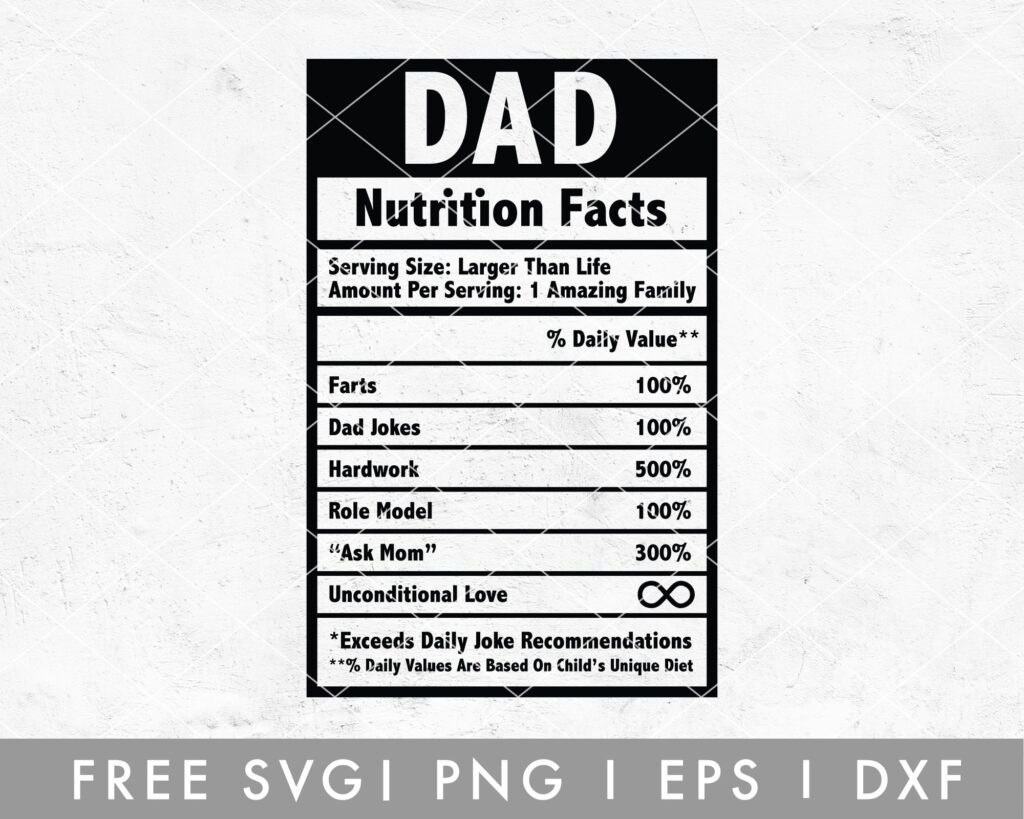Understanding Dad Nutrition Facts
When it comes to nutrition, it’s important to consider the needs and requirements of every individual, including dads. Just like moms, dads also need to maintain a healthy diet to ensure their overall well-being. In this article, we will delve into the essentials of dad nutrition facts and provide valuable information on how dads can optimize their diet for better health and vitality.
The Importance of Dad Nutrition
Proper nutrition plays a vital role in maintaining good health for dads of all ages. It not only helps in preventing chronic diseases but also provides the necessary nutrients to support physical and mental well-being. As dads often have demanding schedules and responsibilities, it becomes even more critical to adopt a balanced diet that fulfills their nutritional needs.
Essential Nutrients for Dads
To ensure optimal health, dads should focus on incorporating a variety of essential nutrients into their diets. Here are some key nutrients that dads should pay special attention to:
Protein:
Protein serves as the building block for muscles, tissues, and cells. Dads should aim to consume adequate amounts of lean meats, poultry, fish, eggs, dairy products, legumes, and nuts to meet their protein requirements.
Fiber:
Fiber is essential for maintaining a healthy digestive system and preventing constipation. Whole grains, fruits, vegetables, legumes, and nuts are excellent sources of dietary fiber that dads should include in their daily meals.
Healthy Fats:
Omega-3 fatty acids are beneficial for heart health and cognitive function. Dads can obtain healthy fats from sources like fatty fish, avocados, nuts, and olive oil.
Calcium:
Calcium is essential for maintaining strong bones and teeth. Dairy products, fortified plant-based milk, and leafy green vegetables are excellent sources of calcium that dads should incorporate into their diet.
Vitamin D:
Vitamin D helps in the absorption of calcium and plays a crucial role in bone health. Dads can obtain vitamin D from sunlight exposure, fatty fish, fortified cereals, and egg yolks.
Vitamin C:
Vitamin C is known for its immune-boosting properties and plays a vital role in wound healing. Citrus fruits, berries, kiwi, bell peppers, and leafy greens are excellent sources of vitamin C.
Tips for a Healthy Dad Diet
Maintaining a healthy diet doesn’t have to be complicated. Here are some practical tips for dads to ensure they meet their nutritional requirements:
Plan Ahead:
Meal planning is key to ensuring a healthy diet. Take some time during the week to plan meals and make a grocery list. This will help you stay organized and make healthier choices.
Include a Variety of Foods:
Don’t stick to the same foods every day. Include a variety of nutrient-rich foods from different food groups to ensure you get a wide range of essential nutrients.
Limit Processed Foods:
Processed foods are often high in calories and low in nutrients. Try to limit your intake of processed foods and focus on whole, unprocessed foods instead.
Stay Hydrated:
Water is essential for overall health. Make sure you’re drinking enough water throughout the day to stay hydrated and support optimal bodily functions.
Practice Portion Control:
Pay attention to portion sizes and avoid overeating. Use smaller plates and bowls to help control portion sizes and prevent excessive calorie intake.
Seek Professional Advice:
If you have specific dietary concerns or nutritional goals, consider consulting a registered dietitian who can provide personalized guidance tailored to your needs.
In Conclusion
Dads play a vital role in their families’ lives, and taking care of their nutrition is crucial for their overall well-being. By incorporating the essential nutrients mentioned above and following a healthy eating plan, dads can optimize their health and have the energy they need to fulfill their daily responsibilities. Remember, a healthy dad is a happy dad!


